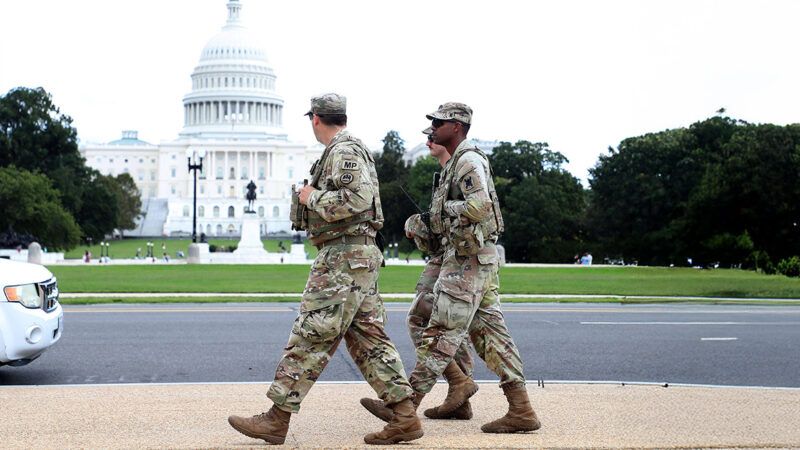The Government Shutdown Isn't Stopping Trump From Amassing 'Emergency' Powers
As of mid-2025, there were roughly 50 simultaneous national emergencies in force.

Usually when we're in the midst of a government shutdown, I'm in a good mood. Sure, recent shutdowns haven't accomplished much in terms of shrinking the cost or scope of the federal government in the long run, but it's nice to walk around feeling a little less governed than usual.
But even that small pleasure has turned sour. Yes, fiscal restraint matters. It matters to this magazine, which has made cutting spending the subject of a greater percentage of our cover stories than perhaps any other publication. And it matters to me personally; I've spent the last 25 years writing about the need to take debt and spending seriously. The size of the state is inversely proportional to personal liberty in ways that are too often overlooked.
But the intense acceleration of the quest to aggregate power in the White House is now unambiguously the more immediate threat to liberty. It's visible every day on my commute to work, as National Guardsmen linger in my D.C. Metro stop. It's visible in the September gathering of the nation's top military officials for something between a pep rally and a company retreat. It's visible everywhere Immigration and Customs Enforcement is staging raids and setting up warrantless checkpoints. It's visible in the administration's moves to take a stake in Intel and broker a TikTok sale. It's visible from space. (As I write this, Blue Origin is completing its 36th New Shepard flight—a bright spot in a dark month.)
The Cato Institute's Gene Healy wrote the bible on the imperial presidency, tracing how voters of all stripes invest outsized hopes in presidents and then act shocked when presidents behave like tyrants. The durable lesson: Don't confer powers on your team's guy that you wouldn't trust in the other team's hands.
But it's hard to break the habit of agglomerating authority when your party is in charge. This problem is cross-partisan and is older than Donald Trump—or Joe Biden, or even Richard Nixon. After Watergate, the nation briefly remembered why limits are good. But it wasn't long before the White House started soaking up power again, and by the 2000s a cadre of executive-power enthusiasts, such as Dick Cheney and Donald Rumsfeld, started pushing hard to "restore" presidential prerogatives. The legal and scholarly scaffolding for today's power grabs was assembled well before the last few months.
Meanwhile, the "national security" and "federal property protection" exceptions have become a tunnel wide enough to drive an armored personnel carrier through. In 2020, the Department of Homeland Security surged hundreds of federal officers into Portland, Oregon, with threadbare training for the job at hand; internal reviews later read like warnings from the future we're now experiencing. Surveillance of protesters and mission creep were inevitable; they were the most predictable features of an overgrown executive. But despite that mess, the boots just keep hitting the ground. Portland is once more bracing for a federalized deployment—this time National Guard troops—with state and local officials fighting back on the grounds of both necessity and legality.
Immigration enforcement shows how this logic lands in daily life. The federal government claims sweeping authority within a 100-mile border zone that covers where nearly two-thirds of Americans live. That zone has long been a gray area for warrantless stops and checkpoints, ripe for masked agents far from any actual border to nick away at ordinary civil liberties. Powers granted today will be used more aggressively tomorrow. And powers used in that 100-mile border zone will soon be used elsewhere.
The emergency is now the default. Most of the knobs and levers a modern president uses to bully companies, police speech, or move bodies around aren't new laws—they're standby powers that switch on with a magic word: emergency. Congress littered the U.S. Code with these shortcuts; the Brennan Center for Justice has cataloged 137 statutory powers that spring to life the moment a president declares one. (Many never fully turn off.) As of mid-2025, there were roughly 50 simultaneous national emergencies still in force; they are renewed annually, spanning everything from sanctions to tariffs. That architecture lets the White House reach for trade controls, financial blockades, and tech blacklists without returning to Congress. If you like your powers separated, this is the opposite.
I still want Congress to do its job on spending: legislate clearly, spend less, and claw back delegations it never should've handed over to the executive branch. The remedy isn't complicated, but it is hard to execute. Congress must take back its rightful powers, narrow emergency authorities, sunset delegations, and relearn the civic discipline of saying "no" to our own would-be redeemers, even when they're on our own team. Kudos to a few senators, Rand Paul (R–Ky.) among them, who in early October tried to take back the power to declare war after the Trump administration made several unauthorized strikes on alleged Venezuelan drug smugglers. (Alas, the vote failed 48 to 51.)
I still like the idea of a shutdown from time to time, to slow the bureaucracy and remind people that daily life goes on without a fully operational government. But I won't trade constitutional constraints for the promise of a quick policy win administered from the Resolute Desk.
This article originally appeared in print under the headline "How To Ruin a Shutdown."


Show Comments (187)